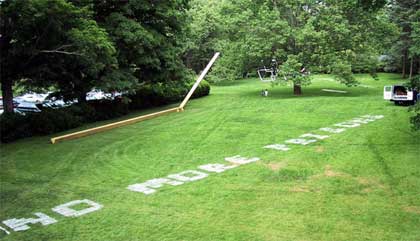![]() According to what i have eaten in the morning i am either a bit cynical about the real impact of activist projects or totally enthusiastic about their objectives and methods. Most of the time i am both. It also depends on the cleverness of the activists themselves. I still have to find any trace of ungainliness when it comes to The Institute for Applied Autonomy. The anonymous activist group believes in the importance of disseminating knowledge, encourages autonomy, and develops methods of self-determination through artistic expression and application of military-like technology to the topics of criminal mischief, decentralized systems and individual autonomy.
According to what i have eaten in the morning i am either a bit cynical about the real impact of activist projects or totally enthusiastic about their objectives and methods. Most of the time i am both. It also depends on the cleverness of the activists themselves. I still have to find any trace of ungainliness when it comes to The Institute for Applied Autonomy. The anonymous activist group believes in the importance of disseminating knowledge, encourages autonomy, and develops methods of self-determination through artistic expression and application of military-like technology to the topics of criminal mischief, decentralized systems and individual autonomy.
You might have read or seen one of their pamphlet-distributing or spray painting robots or participated to the protests during the 2004 US presidential campaign, by using their TXTmob system.

StreetWriter
The Institute for Applied Autonomy (IAA) was founded in 1998 as an anonymous collective of artists, activists, and engineers united by the cause of individual and collective self-determination. Why did you decide to stay anonymous? How much does that anonymity serve your objectives? Is it part of a strategy?
Initially, we embraced anonymity as a defensive tactic, as many of our projects exist in a legal grey area. Working collectively and anonymously seemed natural to those of us with backgrounds in direct-action politics and the hacker and cypherpunks communities. Groups like Cult of the Dead Cow and native Hawaiian activists Hui Malama gave us a model for action that was both publicly engaged and effectively anonymous.
We've also found anonymity to be a useful tactic in dealing with the press. Many journalists seem to be more interested in writing about artists than about the art they create -- this is particularly true when the work has explicitly political content. By refusing to provide any personal information about ourselves, we control the kinds of narratives that journalists create about our work and the issues it engages.
[More....]
Originally posted on we make money not art by Rhizome



